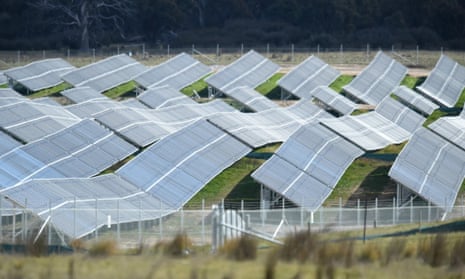The Australian government has been urged to scale up its ambitions for greenhouse gas cuts after European Union leaders struck a deal to reduce emissions by at least 40% by 2030.
Talks in Brussels overnight culminated in one of the first major commitments to post-2020 emissions cuts before a crunch United Nations gathering in Paris next year. The Paris talks are expected to involve nations thrashing out long-term emissions goals.
Australia has a target of a 5% cut in emissions by 2020, based on 2000 levels. The foreign affairs minister, Julie Bishop, told a recent UN summit in New York that Australia’s goal was ambitious but the independent Climate Change Authority has labelled it inadequate, calling for a reduction of at least 15%.
The new EU target, measured against 1990 levels, came with two additional 27% targets – for renewable energy market share and increase in energy efficiency improvement by 2030.
Australia’s renewable energy target mandates that 41,000 gigawatt hours of the country’s energy must come from renewable sources by 2020. The Coalition is seeking to cut this to a “real” 20% of overall energy use, a position opposed by Labor and the Greens.
Asked about the EU deal, a spokesman for Greg Hunt, the environment minister, told Guardian Australia: “We welcome all progress on reducing emissions around the world. The problem with Labor’s carbon tax is that Australia’s emissions were going up not down by 2020.
“We will meet our targets for 2020 and we’ve always said that we will consider progress beyond that in the lead-up to Paris.”
The Greens said Australia’s current emissions target is “disastrously inadequate” and that the Coalition needed to show ambition for deeper cuts.
“Europe has committed to post-2020 cuts of 40%, while in Australia we’re struggling to reach five,” said Christine Milne, the Greens leader. “Tony Abbott is tearing up every piece of clean energy policy he can.
“The Abbott government needs to end its protection racket for the dirty fossil fuel industry and realise we are in the midst of a global energy revolution.”
Erwin Jackson, deputy chief executive of the Climate Institute, said the EU deal was a “stark contrast” to Australia’s efforts.
“The EU’s announcement yet again underscores how much the rest of the world, and our major trading partners like the EU, China and the US, are leaping ahead of Australia, while we are going backwards,” he said.
“It is critical that our renewable energy target contributes to long-term decarbonisation of the energy sector as a key objective, rather than basing the target around short-term industry interests.
“Australia’s power sector needs to continue decarbonising over this and coming decades. This requires a return to bipartisan support for a robust and growing RET, complemented by a measure – regulatory or otherwise – to close down ageing, inefficient coal stations.”
A spokeswoman for Mark Butler, Labor’s environment spokesman, said: “This is further evidence the world is going ahead in leaps and bounds while Australia is in reverse gear.
“Tony Abbott repeatedly said he’ll wait for the world to act before he does. Well, the world has been taking meaningful action like this for many months and still Tony Abbott is still refusing to do anything about climate change.”

Comments (…)
Sign in or create your Guardian account to join the discussion